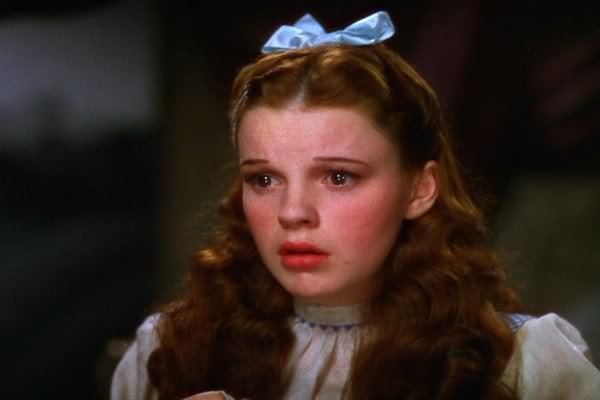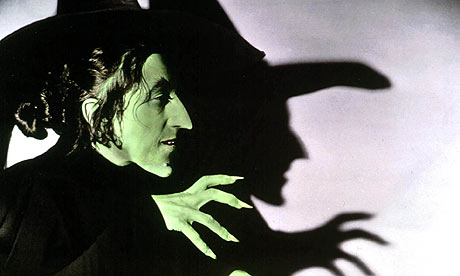Elphaba vs. Society
One of the main conflicts in the novel Wicked is Elphaba’s war against society. Her green complexion and abnormal physical attributes were not accepted because it was not considered the “norm”. Through the course of her life she had to face obstacles and fight the prejudice of society. Her strong dedication and support for animal rights psychologically connects with the manner in which she was treated. The individual’s in Elphaba’s environment continuously treated her as an outcast who did not belong. Her fight for animal rights represented her counter-attack for the treatment she received from society. After she joined the rebellion against the Wizard, she officially became an enemy of the state. Her views opposed the “proper” ideology of society. The Wizard even ordered Dorothy to murder Elphaba to eliminate the enemy of Oz. Elphaba was constantly deemed a villain from her birth due to her eccentric appearance and her future actions have continued to oppose the norm.
The “Dorothy” Problem
 Munchkinland is visited by a storm that propels a house in the air carrying the infamous passenger, Dorothy Gale. Once stepping out of the Kansas bound home she was greeted by the citizens of Munchkinland proclaiming that the witch was dead (Nessarose). Glinda appears out of the blue and sends Dorothy to Oz hoping th Wizard could send her back to the Wizard. For protection, Glinda gives the shoes of Nessarose to Dorothy. Elphaba arrives at the funeral to find out that the shoes she has wanted all her life have been given to another individual. After her return to Kiamo Ko she learns of the plan the Wizard orchestrated to kill Elphaba using Dorothy and her companions. When Elphaba sends her familiars to lead Dorothy and her friends to the castle, they misinterpreted their actions and murdered them all. Dorothy reveals that her main intention was not to kill Elphaba, but to apologise for killing Nessarose. Dorothy throws a bucket of water on Elphaba after she became furious and inadvertently sets her skirt on fire. Elphaba’s fear of water becomes clear when she begins to melt leaving the infamous hat on the floor. In the novel Wicked, Elphaba and Dorothy have many things in common (both have ties to Oz, The Other World, and both “witnesses”). "I see myself there: the girl witness, wide-eyed as Dorothy. Staring at a world too terrible to comprehend, believing ...that beneath this unbreakable contract of guilt and blame there is always an older contract that may bind and release in a more salutary way." (Maguire 279) They have strong connections but the have one main difference is their life. Dorothy seems to be everything Elphaba isn’t and she does not have to try very hard to get the things she wants. "Everything I have, every little thing I have, dies when you come across it," said the Witch” (Maguire 322).Destruction seems to shadow behind Dorothy and effects the people around her (tornado in Kansas, death of Nessarose and Elphaba). Elphaba is considered the evil figure while Dorothy is seen as a saint.
Munchkinland is visited by a storm that propels a house in the air carrying the infamous passenger, Dorothy Gale. Once stepping out of the Kansas bound home she was greeted by the citizens of Munchkinland proclaiming that the witch was dead (Nessarose). Glinda appears out of the blue and sends Dorothy to Oz hoping th Wizard could send her back to the Wizard. For protection, Glinda gives the shoes of Nessarose to Dorothy. Elphaba arrives at the funeral to find out that the shoes she has wanted all her life have been given to another individual. After her return to Kiamo Ko she learns of the plan the Wizard orchestrated to kill Elphaba using Dorothy and her companions. When Elphaba sends her familiars to lead Dorothy and her friends to the castle, they misinterpreted their actions and murdered them all. Dorothy reveals that her main intention was not to kill Elphaba, but to apologise for killing Nessarose. Dorothy throws a bucket of water on Elphaba after she became furious and inadvertently sets her skirt on fire. Elphaba’s fear of water becomes clear when she begins to melt leaving the infamous hat on the floor. In the novel Wicked, Elphaba and Dorothy have many things in common (both have ties to Oz, The Other World, and both “witnesses”). "I see myself there: the girl witness, wide-eyed as Dorothy. Staring at a world too terrible to comprehend, believing ...that beneath this unbreakable contract of guilt and blame there is always an older contract that may bind and release in a more salutary way." (Maguire 279) They have strong connections but the have one main difference is their life. Dorothy seems to be everything Elphaba isn’t and she does not have to try very hard to get the things she wants. "Everything I have, every little thing I have, dies when you come across it," said the Witch” (Maguire 322).Destruction seems to shadow behind Dorothy and effects the people around her (tornado in Kansas, death of Nessarose and Elphaba). Elphaba is considered the evil figure while Dorothy is seen as a saint. The End...
 Wicked explores the theme of destiny in a very vague and complex manner. Elphaba simultaneously has fate and free will in the novel Wicked. The reader ultimately knows Elphaba’s fate as the Wicked Witch of the West but the novel provides the opportunity of choice to her character. The Wicked Witch of the West is a simplistic character presented from the Wizard of Oz but Wicked illustrates a complex variation of the one sided character. The reading experience is an important aspect when reading the novel Wicked. Readers spend the entire book aware of Elphaba’s destiny as the Wicked Witch of the West. Elphaba begins to feel as if a malign being is controlling her life and she begins to become hopeless and analytical about her past by blaming her struggle through life on other individuals. . “I just mean, Glinda, is it possible we could be living our entire adult lives under someone's spell? How could we tell if we were the pawns of someone's darker game (Maguire 442)? Wicked can be considered a tale of destiny because of the foreknowledge of the reader but does it also provide an explanation of her death?
Wicked explores the theme of destiny in a very vague and complex manner. Elphaba simultaneously has fate and free will in the novel Wicked. The reader ultimately knows Elphaba’s fate as the Wicked Witch of the West but the novel provides the opportunity of choice to her character. The Wicked Witch of the West is a simplistic character presented from the Wizard of Oz but Wicked illustrates a complex variation of the one sided character. The reading experience is an important aspect when reading the novel Wicked. Readers spend the entire book aware of Elphaba’s destiny as the Wicked Witch of the West. Elphaba begins to feel as if a malign being is controlling her life and she begins to become hopeless and analytical about her past by blaming her struggle through life on other individuals. . “I just mean, Glinda, is it possible we could be living our entire adult lives under someone's spell? How could we tell if we were the pawns of someone's darker game (Maguire 442)? Wicked can be considered a tale of destiny because of the foreknowledge of the reader but does it also provide an explanation of her death? 

No comments:
Post a Comment